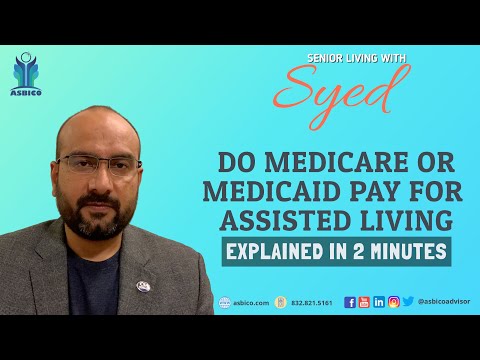Does Medicare or Medicaid Cover Assisted Living?
Contents
- What is Assisted Living?
- What is Medicare?
- What is Medicaid?
- What Does Medicare Cover?
- What Does Medicaid Cover?
- Does Medicare Cover Assisted Living?
- Does Medicaid Cover Assisted Living?
- What Other Options are Available to Pay for Assisted Living?
- What are the Eligibility Requirements for Medicare?
- What are the Eligibility Requirements for Medicaid?
You may be wondering if Medicare or Medicaid cover assisted living. The answer is that it depends on the state you live in and your specific circumstances. In some states, Medicaid will cover assisted living costs, while in others, Medicare may cover a portion of the costs.
Checkout this video:
What is Assisted Living?
Assisted living is a type of long-term care that provides personal care and other services to people who need help with everyday activities. Assisted living is designed for people who need more help than they can get from family or friends, but don’t need the 24-hour medical care that you would find in a nursing home.
What is Medicare?
Medicare is a federal health insurance program for people who are 65 or older, certain younger people with disabilities, and people with End-Stage Renal Disease (ESRD).
What is Medicaid?
Medicaid is a federal and state health insurance program for low-income and disabled people. It is the largest source of funding for long-term care in the United States Medicaid pays for nursing home care, Home Health Care personal care, and other types of long-term care services.
In order to be eligible for Medicaid, you must meet certain requirements. These requirements vary from state to state, but generally, you must be:
– A U.S. citizen or legal permanent resident
– A resident of the state where you are applying for Medicaid
– Low-income or have a disability
If you meet these requirements, you may be able to get help with the costs of assisted living through Medicaid.
What Does Medicare Cover?
Medicare is a federal health insurance program for people who are 65 or older, people under 65 with certain disabilities, and people of any age with End-Stage Renal Disease (ESRD).
Medicare does not cover long-term care (also called custodial care), if that is the only care you need. This means that Medicare will not pay for services like help with activities of daily living such as bathing, dressing, and using the bathroom.
What Does Medicaid Cover?
Medicaid is a government health insurance program that covers low-income adults, children, pregnant women, and people with disabilities. Medicaid pays for long-term care in some cases, but coverage varies from state to state. In general, Medicaid will pay for assisted living if it is considered medically necessary and if the facility meets certain quality standards.
In order to be eligible for Medicaid coverage of assisted living, you must first meet your state’s eligibility requirements. These requirements vary from state to state, but usually include having a low income and being a U.S. citizen or legal permanent resident. If you are eligible for Medicaid coverage of assisted living, you will be responsible for paying a monthly premium and copayments for services.
Medicare does not cover assisted living costs. Medicare is a federal health insurance program for people 65 years of age or older and people with certain disabilities. Medicare does not cover long-term care costs, such as those associated with assisted living. If you have Medicare and need help paying for assisted living, you may be able to get supplemental insurance coverage through a private insurer.
Does Medicare Cover Assisted Living?
Original Medicare, which consists of Part A (hospital insurance) and Part B (medical insurance), does not cover long-term care services such as those provided in assisted living facilities. Medicaid, on the other hand, is a joint federal and state program that does provide coverage for some long-term care services, including assisted living.
Does Medicaid Cover Assisted Living?
Assisted living is a type of long-term care that helps people with activities of daily living, such as dressing, bathing and using the restroom. It also provides assistance with medication management, meals and transportation. Assisted living is different from nursing homes, which provide more intensive medical care.
Medicaid is a federal and state program that helps pay for medical care for people with low incomes orlimited resources. Medicaid does not cover assisted living, but it may cover some services provided in an assisted living facility, such as nursing care or therapies. Each state has different rules about what Medicaid will cover, so it’s important to check with your state’s Medicaid office to see what coverage is available in your area.
What Other Options are Available to Pay for Assisted Living?
If Medicare or Medicaid does not cover assisted living, there are a few other options to pay for this type of care. One option is to use long-term care insurance. This type of policy can help cover the cost of assisted living, but it is important to check with your insurance provider to see if assisted living is a covered service. Another option is to tap into home equity by taking out a reverse mortgage. This can be a good option for seniors who own their home outright or have a significant amount of equity built up in their home. Finally, some families choose to pay for assisted living out of pocket. This can be difficult to do, but it may be the best option for some families.
What are the Eligibility Requirements for Medicare?
To be eligible for Medicare, you must be:
-A U.S. citizen or permanent legal resident
-65 years of age or older
-Have paid into the Social Security system for at least 10 years
-Or have a qualifying disability
If you meet one of the above criteria, you may be eligible for Medicare coverage. However, there are some circumstances in which Medicare will not cover assisted living expenses. For instance, if you require long-term care but do not have a qualifying disability, Medicare will not cover your stay in an assisted living facility. Additionally, if you are eligible for Medicaid coverage, Medicare will not cover your assisted living expenses.
What are the Eligibility Requirements for Medicaid?
To be eligible for Medicaid, you must meet certain financial and other requirements. In general, you must:
Be a U.S. citizen or a legal permanent resident of at least five years
Be a resident of the state where you’re applying for Medicaid
Be unable to pay for long-term care out of pocket
Have countable assets below a certain level (varies by state)
In addition, you may need to meet other requirements, such as being pregnant, disabled, blind or 65 or older.







